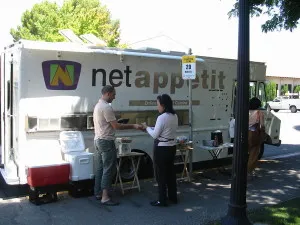Net Appetit, the food truck that was asked to leave campus earlier this quarter under the University’s new mobile food vendor policy, has returned to Stanford, albeit operating as a delivery truck that can only take orders ahead of time.
The terms of Net Appetit’s return, according to an email from Assistant Vice President for Business Development Susan Weinstein ’72 MBA ’79, stipulate that Chon Vo, Net Appetit’s founder and operator, must take orders and payment off campus, prepare and package food off campus and deliver each meal individually to each customer in dorms or offices. If those conditions are not met, Net Appetit will be removed from campus again.

The University’s revised policy for Net Appetit may be more stringent than its approach to other vendors. Delivery services like Domino’s Pizza are paid in cash on campus, while delivery companies often cater large events without delivering food individually to each customer.
Vo said he was unable to reach Weinstein about operating Net Appetit as a delivery service, but ASSU Senator Viraj Bindra ’15 acted as a liaison between Vo – along with concerned students – and Weinstein
Bindra said that when he corresponded with Weinstein about rebranding Net Appetit as a delivery service, she seemed receptive to communication but inflexible about the policy.
“I don’t think she was fully able to appreciate the sense of community that Vo had built,” Bindra said. “[She didn’t believe] that it would merit at least some sort of exception.”
Under the University’s new terms, Vo can continue to serve food in his original location on Santa Teresa Street. Now, however, customers have to place their orders before coming to the truck. In the last week, campus police have visited three times to check that all food is being pre-ordered either by email or text message.
Vo emphasized that he acknowledges the need for regulation through a mobile food vendor policy, but he framed some of the delivery requirements sent to Bindra from Weinstein as unreasonable. However, he expressed general satisfaction with his accomplishments to date.
“[Net Appetit] lasted 10 times longer than I expected, so if it goes away now, personally, I will be totally satisfied because I have done my job,” Vo said.
Vo identified his primary reasons for fighting to stay on campus as his customers and the charity that receives Net Appetit’s profits, Aid to Children Without Parents, an organization in Vietnam that feeds orphans.
“I have a four-year old, and I would never worry about her being hungry in this country, but I worry about her not having the right guidance in her education,” Vo said about the University’s moves to remove him from campus.
A petition in support of Net Appetit and other displaced mobile food vendors, such as Mia’s Catering, has meanwhile continued to gain signatures.
Bindra said that he signed the petition because he disagreed with the manner in which Net Appetit’s removal was handled, despite understanding both the University’s position on the matter and Vo’s perspective.
“I’m slightly pessimistic about [the petition] having any actual impact, but I do agree with the spirit of it,” he said. “I do agree that the University shouldn’t be taking super staunch policies on things that negatively impact the community at Stanford.”
Amidst the ongoing uncertainty involving food trucks on campus, the Stanford Federalist Society hosted a talk about food trucks and economic liberty on Thursday, Feb. 21 at the Stanford Law School. Lawyers and representatives of various food vendor associations spoke about food truck owners’ economic rights to sell food and earn a living.
However, Matt Geller, head of the Southern California Mobile Food Vendors Association, noted that food trucks “basically have zero rights” on a university campus.
“Stanford has the right and the power to manage its own campus, but beyond that, it should definitely listen to what students have to say,” said Bert Gall, director of the Institute for Justice’s National Street Vending Initiative. “It sounds like there’s been some real backlash, and people are going to miss the trucks that can’t be here anymore, and Stanford probably should have thought about that before contracting out to Off the Grid for the exclusive rights.”
Dan Hugo, head of the Bay Area Mobile Food Vendors’ Association, said that the Stanford community needs to work together to change University policy.
“People are not dissatisfied actively enough in large enough numbers,” he said. “Maybe there’s a unifying force behind Net Appetit.”
Despite that apparent lack of popular dissatisfaction, Vo is back on campus and looking forward to serving his regulars.
“More than anybody, I want this to end in a happy way,” Vo said.
